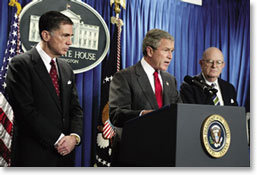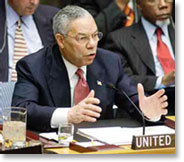Related story:
U.S. casualty count in Iraq under scrutiny (FCN, 12/04/2004)

THE WHITE HOUSE (FinalCall.com) – President George W. Bush continues to defend his decision to lead the United Sates into war against Iraq although weapons of mass destruction (WMD) have not been found there.
Trusted members of the Bush “war cabinet” however, as well as this country’s top military, national security, and intelligence experts have confirmed that the evidence used by the administration to convince more than half of the American public and overwhelming majorities in both houses of Congress to support the unprovoked, “pre-emptive” military action by this country, simply was not true.
While even Mr. Bush now acknowledges that much of the intelligence on which he based his decision to go to war was faulty, he insists that neither he nor his aides manipulated the information or intentionally misled the nation about the Iraqi threat.
But his own words before the war, and now serious doubts by officials and experts trusted by his administration, have undercut every shred of credibility that his government, and the government of Britain’s Tony Blair–his chief ally–ever had before the invasion.
“There was no doubt in my mind that Saddam Hussein was a danger to America … because he had the capacity to have a weapon, make a weapon,” Mr. Bush said in an interview defending his actions with NBC‘s “Meet The Press” broadcast Feb. 8.
Now, he says Iraq had “the capacity to have a weapon”–a far cry from his hysterical and exaggerated rhetoric leading up to the U.S.-led attack.

Before the blistering U.S. “shock and awe” campaign was launched, Mr. Bush’s language was unequivocal. “Intelligence gathered by this and other governments leaves no doubt that the Iraq regime continues to possess and conceal some of the most lethal weapons ever devised,” Mr. Bush said in a national address March 17, 2003, on the eve of the attack.
“The Iraqi regime is a threat of unique urgency. … In defiance of pledges to the UN, it has stockpiled biological and chemical weapons,” Mr. Bush said in Rose Garden remarks on Oct. 2, 2002 surrounded by both Democratic and Republican Congressional leaders.
“The Iraqi regime has violated all of (its UN) obligations (to disarm). It possesses and produces chemical and biological weapons. It is seeking nuclear weapons,” Mr. Bush said five days later in Cincinnati, in a major speech on his Iraq war policy.
The danger posed by Iraq was “urgent,” “already significant” and “imminent” Mr. Bush said time and time again throughout 2002 and early 2003, arguing that the country possessed “thousands of tons of chemical agents, including mustard gas, sarin nerve gas, VX nerve gas.”
“And it only grows worse with time,” Mr. Bush said in Cincinnati. “If we know Saddam Hussein has dangerous weapons today–and we do–does it make any sense for the world to wait to confront him as he grows even stronger and develops even more dangerous weapons?”
Mr. Bush cited surveillance photos and satellite photos which “reveal that Iraq is rebuilding facilities at sites that have been part of its nuclear program in the past. Iraq has attempted to purchase high-strength aluminum tubes and other equipment needed for gas centrifuges, which are used to enrich uranium for nuclear weapons.”
All of these claims proved untrue.
“Facing clear evidence of peril, we cannot wait for the final proof–the smoking gun–that could come in the form of a mushroom cloud,” Mr. Bush continued on Oct. 7, 2002, raising the specter of a nuclear attack against the U.S.
“After 11 years, during which we have tried containment, sanctions, inspections, even selected military action, the end result is that Saddam Hussein still has chemical and biological weapons and is increasing his capabilities to make more. And he is moving ever closer to developing a nuclear weapon.
“The time for denying, deceiving, and delaying has come to an end. Saddam Hussein must disarm himself–or, for the sake of peace, we will lead a coalition to disarm him.”
But it appears Iraq had no such weapons. It appears Iraq had already been “disarmed.”
Internally, instead of seriously considering the doubts and protests of hundreds of thousands of anti-war protestors, or from former executive branch officials and members of Congress, the Bush war-team never seemed to question why war was necessary, they simply discussed how to make it happen.
In fact, by Mr. Bush’s own account, he may have had a personal score to settle. “There’s no doubt (Pres. Saddam Hussein’s) hatred is mainly directed at us. There’s no doubt he can’t stand us. After all, this is a guy that tried to kill my dad at one time,” Mr. Bush told a Houston audience on Sept. 26, 2002.
The Bush administration was using innuendo and exaggerated evidence all the time. Now, Mr. Bush has launched a sales campaign, a “charm offensive,” so to speak: appearances in several states shortly after the Democratic Party primaries were held; his own interview appearance on NBC; and even interviews by his wife, in order to shore up his credibility.

Chief U.S. WMD-hunter David Kay may have delivered the most stunning blow. After leading a fruitless six-month search throughout the country after the U.S. was in full control of Iraq, Dr. Kay said, on resigning from his post in late January, that the intelligence community, particularly the CIA, clearly exaggerated the size and scope of Iraq’s alleged WMD program.
“I don’t think they existed,” Dr. Kay told a Senate Intelligence Committee hearing Jan. 28, insisting that he as well as the intelligence community “were almost all wrong” about Iraq’s alleged weapons stockpiles. “It turns out that we were all wrong probably, in my judgment.”
Central Intelligence Agency Director George Tenet defended his agency’s work, in a Washington speech Feb. 5. He described the intelligence business as an imprecise art form where analysts “are never completely right or wrong,” insisting however, that the CIA never claimed Iraq was an immediate threat to its neighbors or to the U.S., even though Bush and Blair administration officials used that scare tactic to justify war.
Both President Bush and Prime Minister Blair have set up commissions to examine the gathering of intelligence, but not its use (or misuse) by officials which led to war. In Britain, questions surrounding the war gained intensity with the revelation–before he committed suicide–by Dr. David Kelly, the British defense department’s chief weapons expert, that the Blair administration “sexed up” intelligence reports in order to justify the decision to attack.
The first serious cracks in the U.S. pro-war front came in mid-January when former Treasury Secretary Paul O’Neill claimed that the president and his closest aides were looking for a justification for invading Iraq, even before the Sept. 11, 2001 terrorist attacks on Washington and New York City.
“From the very beginning, there was a conviction that Saddam Hussein was a bad person and he needed to go,” said Mr. O’Neill in his book, “The Price of Loyalty: George W. Bush, the White House and the Education of Paul O’Neill.” The “very beginning” means his first National Security Council meeting with the Bush team, less than two weeks after Mr. Bush’s inauguration on Jan. 20, 2001. The book was co-authored by journalist Ron Suskind.
Mr. Bush was so disengaged that he was like “a blind man in a room of deaf people,” during his early cabinet meetings, said Mr. O’Neill.
Now, Secretary of State Colin Powell, who made a dramatic “show-and-tell” presentation complete with slides and satellite photos before the UN Security Council, has also joined the chorus of doubters. Following Dr. Kay’s testimony, and evidence that disproved practically every assertion Mr. Powell made at the UN, Mr. Powell told Washington Post reporters and editors in early February that, if only he had known that Iraq had no WMD, he would have questioned the rationale for going to war.
“The gravity of this moment is matched by the gravity of the threat that Iraq’s weapons of mass destruction pose to the world,” Mr. Powell said at the UN. Mr. Powell’s chief weapons analyst however–who had retired four months earlier after 25 years of service–knew Mr. Powell’s claims were exaggerated.
Iraq did not pose an imminent threat to the U.S. or the world, Greg Thielmann, the State Department’s former director of the Office of Strategic Proliferation and Military Affairs told CBS news on Feb. 4. “I think it didn’t even constitute an imminent threat to its neighbors at the time we went to war.”
Even the U.S. Army’s premier academic institution issued a scathing report, condemning the Bush administration for pursuing an “unnecessary” war that has left the Army “near the breaking point.”
Authored by Dr. Jeffrey Record, a visiting professor at the Air War College at Maxwell Air Force Base in Alabama and a former congressional intelligence committee senior staff member, the report argued that Iraq was “a war-of-choice distraction from the war of necessity” to combat terrorism, and that it “promises much more than it can deliver.”
For his part, former Chief UN Weapons inspector Hans Blix said that the British government had “dramatized” some of its pre-war evidence about Iraq’s threat, and that both Messrs. Blair and Bush had behaved like insincere salesmen who “exaggerated” their intelligence in order to win support for the war they wanted to wage.
Referring to the British government’s controversial assertion–relied on by the Bush administration, as well–that WMD could be deployed within 45 minutes, Dr. Blix insisted: “The intention was to dramatize it, just as the vendors of some merchandise are trying to exaggerate the importance of what they have. I think we issued the correct warning. Nevertheless, they did not take that seriously.”
It is unlikely that there ever was any “intelligence failure,” just an administration bent on going to war, analysts now agree. Mr. Bush, in fact, “betrayed” the country, said former Vice President Al Gore. “I tried to warn our nation that this proposed war in Iraq was being put forward on false premises and was a terrible mistake and would create extreme difficulties for our nation,” he told Tennessee Democrats in a speech Feb. 8.
Mr. Bush “betrayed us,” Mr. Gore shouted to the screaming crowd. “He took Americans on an ill-conceived foreign adventure, dangerous to our troops, that was pre-ordained and planned before 9/11.”












